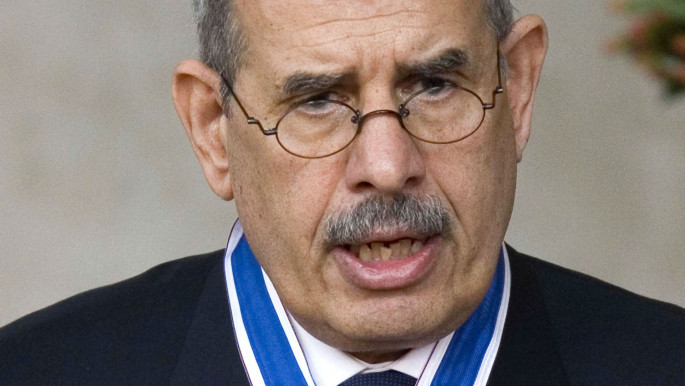#25Jan: Ten big names during the 2011 Revolution
From long-time president's son Gamal Mubarak to the rise of activists such as the Ahmed Maher, the 2011 Egyptian Revolution - which began on 25 January - made and broke big names in Egypt.
Here are ten leading figures who played a role during the tumultuous days leading to Mubarak's overthrow eight years ago.
Hosni Mubarak
He became president in 1981, with protesters in 2011 raging against his brutal and autocratic rule. Mubarak was toppled in February 2011 and briefly jailed before being acquitted by an Egyptian court of ordering the deaths of protesters. He remains a free man, but is under investigation for other charges.
Gamal Mubarak
Son of Hosni Mubarak, Gamal was known as a high-spending business tycoon and a key figure in the ruling National Democratic Party who was tipped to inherit the presidency from his father. He and his brother Alaa have been arrested, accused of stock market manipulation, but were released on bail.
 |
| Gamal [left] and Hosni Mubarak [Getty] |
Egypt's long-time security chief was accused of being Mubarak's "trouble shooter", who helped cement a police state. He was made vice-president by Mubarak during the build-up to the 2011 Revolution, in a failed attempt to placate protesters. He attempted to run for president in Egypt's first elections in 2012 but was disqualified. He died in the US where he was undergoing medical treatment.
Mohammed ElBaradei
An Egyptian diplomat who became a well-known figure worldwide when he headed the International Atomic Energy Agency during the build-up to the 2003 US-led invasion of Iraq. He returned to Egypt in January 2011 and joined the anti-government protests in Tahrir Square. He put himself forward as a possible leader for Egypt, post-Mubarak, but did not run for president in 2012.
He stepped down as vice-president in 2013, following the massacre of protesters by the military shortly after Abdel Fattah al-Sisi overthrew Egypt's first democratically-elected government. He lives in self-imposed exile in Austria.
 |
| Mohammed ElBaradei [Getty] |
Alaa Abd El-Fattah
Activist Alaa Abd El-Fattah was a leading activist in the 2011 Revolution. He campaigned against the military rule that followed the revolution, and the 2013 coup that overthrew Egypt's first democratically-elected government. He was jailed repeatedly in the years that followed the revolution and was given a five-year sentence in 2015.
Ahmed Maher
The activist was a key player in the 2011 protest movement that eventually toppled Mubarak and headed the April 6 Youth Movement. He was detained in 2013 and released in 2017, but lives under "half-imprisonment" having to spend each night at a local police station, according to reports.
Mohammed Hussein Tantawi
The shadowy military figure was a leading officer in the army, which were seen as a less brutal force during the 2011 uprising than the ministry of interior's police force. He then headed the SCAF, which ruled Egypt after Mubarak's overthrow until democratic elections were held in 2012.
 |
| Ahmed Shafiq lived in exile in the UAE [Getty] |
Mohammed Badie
The Supreme Guide of the Muslim Brotherhood, Badie was the highest-ranking members of the Egyptian branch to be jailed following the 2013 crackdown against the movement. He was given the death sentence in 2015 and remains behind bars.
Ahmed Shafiq
Shafiq was the last prime minister to serve under Mubarak. He stood for president in 2012 but lost to Mohamed Morsi, and then fled to the UAE. He was forced to return to Egypt by the Emiratis in December 2017, after saying he intended to run for president against Abdel Fattah al-Sisi. The presidential election saw all Sisi's main opponents jailed or pressured into quitting the race, including Shafiq.
Wael Ghonim
The Google executive started the Facebook page "We Are All Khaled Said" in 2010, following the brutal murder of Said by Egyptian police. Details of the horrific killing continued to fuel anger against policy brutality during the 2011 uprising. Ghonim returned to Egypt from the UAE when the protests broke out. He was detained by authorities but later released on 7 February to crowds of supporters and continued to address Tahrir Square protests.





 Follow the Middle East's top stories in English at The New Arab on Google News
Follow the Middle East's top stories in English at The New Arab on Google News


